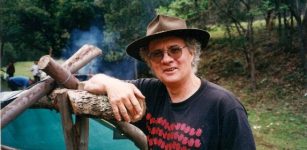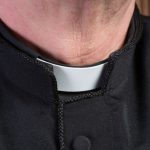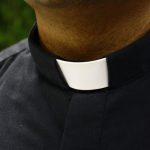From the Pulpit to the Bench: An Interview with Chris Geraghty

After years of tension with his seniors at the Catholic Church, Chris Geraghty walked away from the priesthood in October 1976. He’d served 15 years in the Archdiocese of Sydney, after training in the seminaries since the age of 12.
Right from the beginning he’d felt imprisoned. He entered the Springwood seminary in 1951, and life there was isolating. At the age of 23 he was ordained and was looking towards a life of celibacy, with no companionship.
An anti-intellectual institution
From 1968, Mr Geraghty lectured in theology at Springwood for four years, but found it depressing. And he clashed with the head of the seminary.
Later, he was sent to study liturgy in Paris. And it was there he came to realise the Australian Catholic Church was an extremely conservative institution.
After returning to Australia, he found himself in conflict once again with the Church hierarchy. This time it was over a series articles he published in a Catholic magazine.
He decided it was time to leave. A year later he married his wife Adele, whom he’d met on a brief trip to Germany.
Today, Geraghty still holds his faith, but he’s a critic of the Church. He attends mass on Sundays, but he refers to himself as more of a “fringe dweller.”
The royal commission
On January 3 this year, Mr Geraghty presented a submission to the Royal Commission into Institutional Responses to Child Sexual Abuse. He sought to trace the origins of what he described as this “dark tendency within the Church.”
Earlier this month, the royal commission revealed some startling findings. They identified 1,880 alleged child sexual offenders within the Catholic Church between the years 1980 to 2015. Overall, they found that 7 percent all Catholic priests had been accused of molesting children.
This scandal goes right to the top. Former Archbishop of Sydney, Cardinal George Pell has had child abuse allegations levelled against him. However, Australia’s most senior Catholic now sits in Vatican City, employed as the Church’s chief financial officer, refusing to return to Australia.
Turning to a career in law
After leaving the priesthood behind, Geraghty turned to law. He studied at the Barristers Admission Board, which was run by the NSW Supreme Court, and obtained his Diploma in Law. He practised as a solicitor at a Sydney law firm, and was eventually admitted to the NSW bar.
From there he proceeded to make his way to the bench. In 1993, he became a judge in the NSW Compensation Court. After that closed down, he moved to the Sydney District Court, where he served until his retirement in 2008.
Mr Geraghty professes that his greatest achievement are his two children. He’s currently undertaking research into the role that misogyny plays within the Catholic Church. In 2012, he published his third memoir, titled Dancing with the Devil.
Sydney Criminal Lawyers® spoke with Chris Geraghty about the scandal surrounding the Catholic Church, why the priesthood didn’t suit him, and his experience of sitting in the judge’s chair.
Earlier this month, the royal commission released some shocking figures that reveal just how rife paedophilia is in the Catholic Church.
How does such a large institution like the Catholic Church continue to operate in the community like everything’s normal, while such high levels of child abuse are going on?
I must say that’s a mystery to me. It does look like it’s business as usual. They’re all dressing up in the same clerical gear. They’re having mass on Sunday. They’re still singing Gregorian in the cathedral, and polyphonic music. They’re still incensing the altar. They’re still collecting money.
I would have thought that they would have immediately withdrawn, and got dressed in sackcloth and ashes, and spent a year not celebrating confirmations and things, but concentrating on what they have to do to express their regret, their sorrow, their humiliation and guilt for what’s gone on.
And maybe looking after homeless people. But they should continue on looking after their hospitals, and maybe their schools – that’s a wonderful service. Although, some of them are very expensive schools, I’ve got to say. But the parish schools are providing a great service.
But looking after homeless people. Looking after the poor. And particularly, looking after the victims of sexual abuse. They’ve got to establish an institute maybe and provide a fantastic service that goes on. Because their focus has been on the priests, rather than on the victims.
You presented a submission to the royal commission on January 3 this year. You discussed the Church’s protection of offenders and its failure to protect innocent children from them.
What do you outline in your submission as the reason why the Catholic Church has such endemic paedophilia running through its clerical ranks?
Look it’s a very complicated question. It’s a question, first of all, about assessment of candidates for the priesthood. It’s never been seriously confronted about who they have.
They used to accept everybody. They accepted me at the age of 12. And I never had any assessment throughout the whole twelve years that I was training.
The next thing is the formation, looking after people. But then you’ve got that overarching kind of ideological thing about the attitude – the really, really poisonous attitude to sex, and to the flesh. And to women.
They’ve got a program of forgiveness that allows all sins to be forgiven, irrespective of their seriousness. All mortal sins: from going to mass on Sunday, and not eating meat on Friday – all kinds of mortal sins like that – going right up to paedophilia, bestiality and murder.
All can be forgiven in a rather trivial kind of sacrament. So there’s a trivialisation of evil really. It can go back to what it was like in the holocaust too. It’s mankind’s institutions and tendency to trivialise evil.
You’re a former Catholic priest. You served for fifteen years in the Archdiocese of Sydney. In your time were you ever aware that these sort of transgressions were occurring?
Just recently, one of my students from Springwood came to see me after forty years. He reminded me that he’d come to tell me that the spiritual director there was coming onto him. He wasn’t a child at that stage.
I was vaguely aware that some priests were misbehaving sexually, but not with children.
You left the priesthood in 1976. During your time as a priest you came into conflict with your seniors in the Church over intellectual matters.
Well yeah, it was about this trivialisation of sin and the confessional.
Prior to leaving you were sent to study liturgy in Paris and it was in Europe that you realised the Australian Catholic Church was terribly conservative.
What finally made you abandon the priesthood?
I think probably that I was not someone who submitted to authority very easily. And I was not an organisational person. It took me a long time to realise that. I had trouble with bishops, and I had trouble with censorship.
And then I met my future wife Adele. She came to Australia, and this was my escape if you like.
I escaped from a very unhappy and very depressing kind of life I was living.
After you left the priesthood, you went onto study law and you were eventually admitted to the NSW bar. What led you into a career in law?
Why did I do law? Well, because I could do it at night, and work during the day basically. I was married. I had a family. And I wanted to work for myself. I had been working for Channel 10 as a journalist. I’d been working for the Health Department for a while, as a public relations officer.
But I wanted to work for myself. I needed to, because I didn’t particularly like working for other people. So this allowed me to do it, because I could do it at night.
But once you got into law, you continued on with it. What did you find in law that kept you there?
People. I really wasn’t interested in the academic business. I thought theology was much more interesting than the law. The law was pretty dry, but I wanted to get it right. But people kept me there.
I loved dealing with people. I loved dealing with the barristers, when I was a judge. I loved dealing with the witnesses. I loved people coming and seeing me, and trying to help them with their problems.
Between 1993 and 2008, you served as a judge at the NSW Compensation Court and then the District Court. What would you say you achieved in your time as judge?
I tried to achieve a merciful face for justice really. I worked hard and I enjoyed what I was doing. I tried to achieve justice leavened with mercy really.
You wrote a paper called ‘Discretion or Prejudice,” in which you described the sentencing function of a judge as a “delicate balancing act.” As you outlined, a judge has to work out an “appropriate” sentence, and prison should be a last resort.
Do you think Australian judicial officers overly rely on handing down harsh prison sentences? And in your opinion, do they leave their prejudices at the door when they’re sentencing?
Well nobody leaves their prejudices at the door. Nobody. The best thing to do is to be able to recognise your prejudices. The person that you’ve got to be frightened of, is the person who doesn’t think he’s prejudiced.
Our mothers and fathers are the ones who have determined our lives, I think, rather than what justice is. And some people are merciful and some people are tough by nature.
And do I think they deliberately hand down harsh sentences? In my experience, the judges at first instance don’t. Some of them do, but most of them don’t.
But they’re brought into line by some pretty harsh appeal court judges.
When you were handing down a sentence, how did you overlook your prejudices?
You don’t overlook them. You try to be conscious of them.
I knew I was a soft judge, I knew that. So what did I do? I tried to marry what I was doing with what the Court of Appeal was trying to guide me do. I’d say, “Well, if I’ve handed down too lenient a sentence, it’s going to go to the Court of Appeal, and he’s going to get a tougher one.”
But look prison’s not the answer to anything, except to keep evil people off the street.
And as you further pointed out in your sentencing paper there’s “a range of alternatives available to a sentencing judge other than” handing down full time custodial sentences.
In your time serving at the bench, what alternative sentences did you favour? And how successful did you find them once you imposed them?
I really liked putting people on probation. So before I sentenced them I was able to give them a year of trying to prove themselves, particularly druggies.
So you’d send them away and entrust them to a guide, or a father, or a mother, or someone. And bring them back every couple of months really and see how they were going. And sentence them at the end of twelve months.
I really liked to do that. So they knew they were on a short string, but they had to do their best. I liked that.
I liked suspended sentences, so that they knew if they offended further, they’d come back and be sentenced on the first instance.
Indigenous Australians are overrepresented in the Australian criminal justice system. While Aboriginal and Torres Strait Islander people make up 3 percent of the population, they make up around 28 percent of the prison population.
What are your thoughts on how the nation’s justice system is treating Indigenous Australians?
They’ve got their own culture. They’ve got their own beliefs. Their own system. I’d really like to cooperate with their elders in some kind of sentencing program.
But it’s a shocking scandal for Australia, the way we’ve treated the Aboriginal people.
Back to the Catholic Church, after the revelations about the extent of child abuse within its ranks, do you think this institution can simply continue on, or do you think some major reforms will have to occur?
I think some major reforms have to occur. I don’t think they will, I must say. There are too many old men at the top, who’ve never had a family, and never had children. And they’re unconsciously, or consciously, wanting their own career.
I don’t hold that much hope for it, I must say.
Do you think the concept of celibacy is going too far in today’s world, that priests are expected to remain celibate for their whole lives?
Of course I do. I mean, you don’t ask a 23-year-old person to give up the rest of his life. It’s unnatural.
Some people, a few people, do it. But honestly, it’s a hard ask.
And it’s not just a contributing factor to paedophilia. It’s a contributing factor to clergy misbehaving sexually with adults, all over the place. And also, drinking too much, being depressed, and being on antidepressants and so forth.
It’s a hard ask. And it’s not reasonable, or natural.
So you think that sort of reform needs to happen today in the Catholic Church?
I wouldn’t hold my breath.
But it would be a constructive move?
It’s essential, I think, if they’re going to continue on.
Chris thanks very much for taking the time out to speak with us today. And best of luck with the research you’re currently carrying out.
Good on you Paul.







